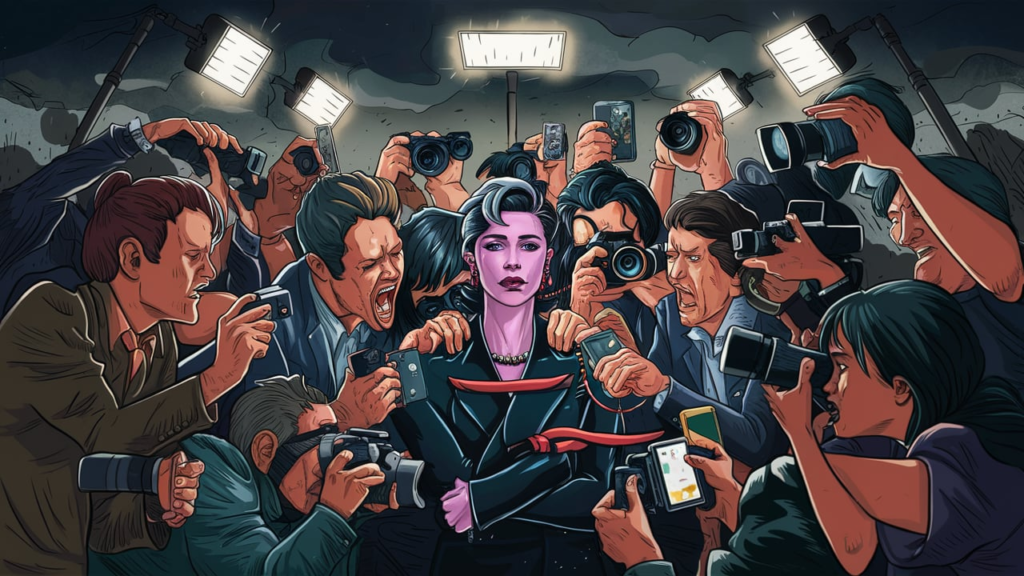
The world of celebrity culture has evolved dramatically with the advent of social media and 24/7 news cycles. One particularly invasive aspect of this evolution is the rise of homarazzi – paparazzi targeting LGBTQ+ celebrities. This phenomenon has raised significant concerns about privacy, safety, and the overall well-being of those in the spotlight.
Understanding Homarazzi
The term “homarazzi” is a portmanteau of “homosexual” and “paparazzi,” coined to describe the specific harassment faced by LGBTQ+ celebrities. Unlike traditional paparazzi, homarazzi often target individuals for their sexual orientation, engaging in discriminatory and invasive behavior.
Homarazzi tactics can range from persistent stalking and harassment to the publication of private photos and personal information. These actions not only violate the privacy of celebrities but also contribute to a hostile environment for the LGBTQ+ community as a whole.

The Impact of Homarazzi
The consequences of homarazzi can be devastating. Celebrities targeted by homarazzi often experience:
- Mental Health Issues: The constant pressure and invasion of privacy can lead to anxiety, depression, and even post-traumatic stress disorder.
- Safety Concerns: Homarazzi behavior can escalate to physical threats and stalking, putting celebrities at risk of harm.
- Career Implications: Negative publicity generated by homarazzi can damage a celebrity’s reputation and hinder their professional success.
- Public Stigma: The overexposure of private lives can contribute to the perpetuation of harmful stereotypes and discrimination against the LGBTQ+ community.
The Role of Social Media
Social media has amplified the impact of homarazzi. Platforms like Instagram, Twitter, and TikTok allow anyone with a smartphone to become a potential paparazzi. The ease of sharing photos and videos has made it increasingly difficult for LGBTQ+ celebrities to maintain their privacy.

Moreover, social media has created a culture of celebrity obsession, where fans often cross the line between admiration and harassment. This environment can embolden homarazzi, as they believe their actions will be rewarded with likes, shares, and comments.
Legal and Ethical Implications
The legal landscape surrounding homarazzi is complex and often inadequate. While some jurisdictions have laws protecting individuals from harassment and invasion of privacy, these laws may not specifically address the unique challenges faced by LGBTQ+ celebrities.
There is a growing call for stricter regulations and penalties for homarazzi. This includes measures such as increased surveillance of paparazzi, stricter privacy laws, and harsher punishments for those who violate these laws.
Additionally, media outlets have a responsibility to exercise ethical journalism and avoid contributing to the homarazzi culture. This includes refraining from publishing invasive photos or information, and treating LGBTQ+ celebrities with respect and dignity.

Protecting LGBTQ+ Celebrities
To combat homarazzi, a multi-faceted approach is necessary. This includes:
- Increased Legal Protection: Strengthen privacy laws and create specific legislation to address homarazzi.
- Industry Self-Regulation: Media outlets and platforms implementing stricter guidelines for paparazzi behavior.
- Public Awareness: Educating the public about the harmful effects of homarazzi and promoting respect for privacy.
- Support for LGBTQ+ Celebrities: Providing mental health resources and legal support to those affected by homarazzi.
By taking these steps, we can create a safer and more equitable environment for LGBTQ+ celebrities.
Conclusion
Homarazzi is a serious issue that demands attention and action. It is essential to recognize the human impact of this behavior and to work towards a world where LGBTQ+ celebrities can live their lives without fear of harassment and invasion of privacy. By understanding the complexities of homarazzi and advocating for change, we can help create a more inclusive and respectful society for all.


